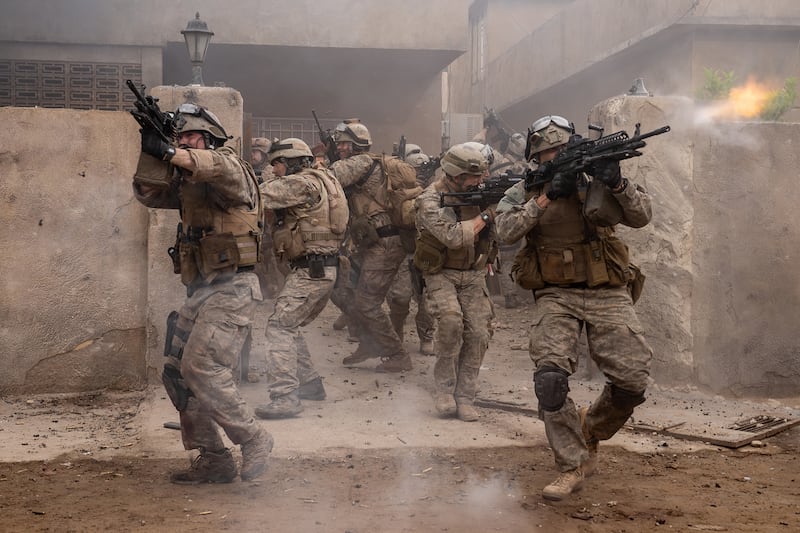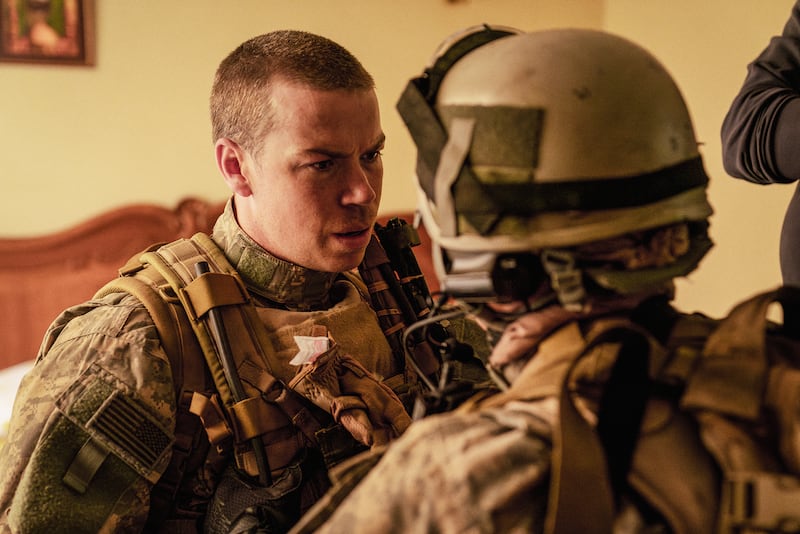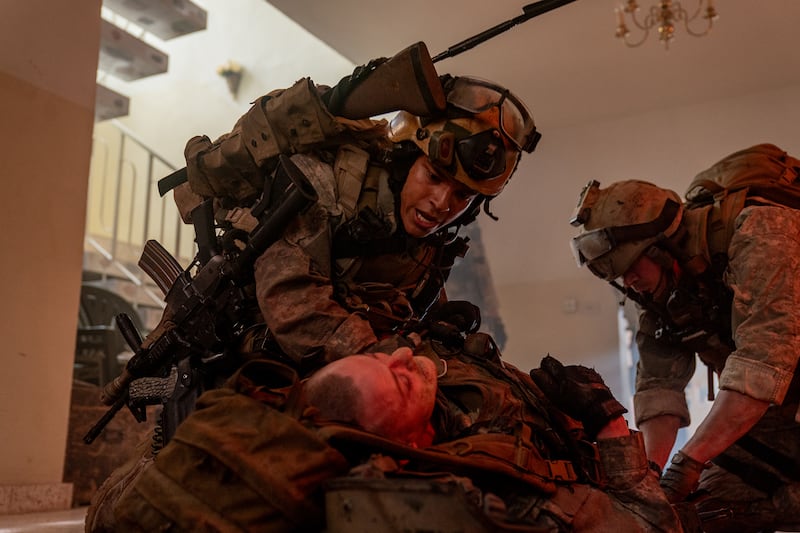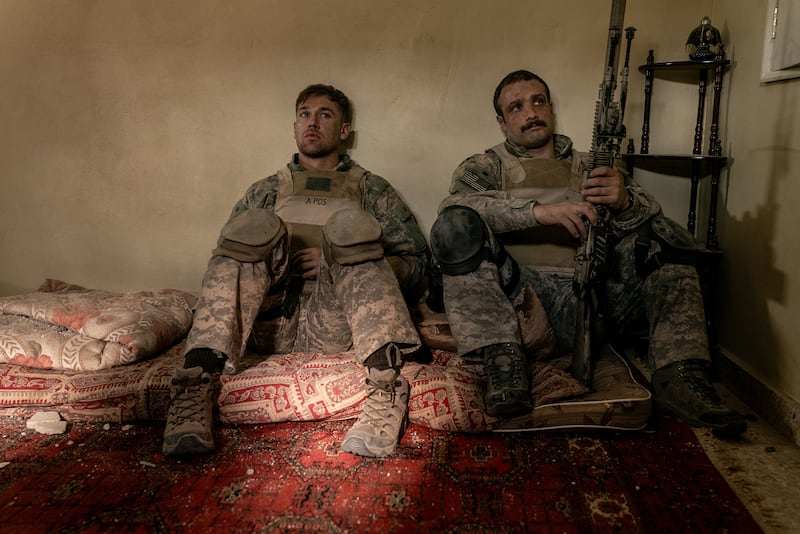Every military encounter with the enemy is a war unto itself, and Warfare immerses itself in one such skirmish in real time and with harrowing, up-close-and-personality intensity.
Having imagined a fictional domestic conflict with last year’s Civil War, Alex Garland shifts his attention to a foreign battle with his latest, a based on-true-events drama co-directed by Ray Mendoza, whose experiences as a Navy SEAL during the Iraq War are the basis for its blistering and brutal action. An apolitical tribute to the brotherhood shared by American soldiers, and the sacrifices they make to ensure that everyone gets home alive, it’s a taut and terrifying portrait of courage under fire.
A hilariously sexual exercise video set to an escalating club beat proves the sole instance in Warfare featuring music, as well as anything approaching genuine levity. The Navy SEALs watching this clip hoot, holler, and jump around with the ebullient excitement of men amped up to the point of exploding, and Garland and Mendoza cut from this boisterous sight to a hushed nighttime street in Ramadi, Iraq circa 2006, where the battalion creeps down sidewalks searching for a location to set up a sniper position that’ll protect a squadron of Marines.
When they find a suitable residence, they noiselessly sneak inside, rounding up the surprised family that occupies its first floor before they can scream, and smashing through a wall that sits at the top of the abode’s staircase—a barrier that, they deduce, divides the building into two separate apartments.

Upon accessing the upstairs (and corralling its inhabitants), the soldiers take up various positions and begin their long wait. Garland and Mendoza don’t overtly delineate these individuals’ duties and personalities, opting to simply sit alongside them and allow their conduct to reveal their roles.
Lying on a pile of mattresses, Elliot (Shogun’s Cosmo Jarvis) stares through the scope of his sniper rifle at men moving around across the street, relaying intel about potentially suspicious figures to his fellow marksman Frank (Taylor John Smith). Elsewhere, Ray (Reservation Dogs’ D’Pharaoh Woon-A-Tai)—i.e. the film’s director—radios with commanders, Lt. McDonald (Michael Gandolfini) surveys the area on a monitor displaying a satellite feed, Sam (Joseph Quinn) paces in a bedroom when not staring out a front window, and Erik (Will Poulter) casually oversees everything as the officer in charge.
Warfare’s early passages are drenched in silence, and as night turns to day, the film’s quiet grows oppressive, such that every softly spoken word and environmental noise proves jarring. Garland and Mendoza shrewdly exploit the interplay between tranquility and cacophony, and they flesh out their scenario through evocative details that ring true—no surprise given that the writing/directing duo’s script is based entirely on the memories of Mendoza and his comrades.

Be it Sam running his finger along a dusty metal shaft, McDonald backwashing in his water bottle in order to (unsuccessfully) dissuade his mate from drinking from it, or a medic accidentally administering a morphine shot upside-down so that his own finger gets stuck, the proceedings are engrossing precisely because of their authenticity—and, relatedly, their lack of typical Hollywood verbal or narrative flourishes.
Despite the day’s superficial calm, the threat of danger accelerates rapidly in Warfare, and trouble arrives in the form of a grenade tossed into their hiding spot. Temporarily stunned, and with Elliot injured, Erik and Ray call for an evacuation and have everyone methodically gather their gear, making sure not to leave anything behind for their adversaries to collect. This is referred to as “collapsing” their base of operations, and their procession out of the house and to the tank that’s picking them up is dubbed a “breakout.”
Like everyone’s rank, these terms aren’t defined; their meaning is gleaned via the circumstances at hand—a storytelling strategy that elicits forceful moment-to-moment engagement with the soldiers’ attempts to assess their predicament, devise a strategy for survival, and efficiently execute their plan.
Things go from bad to catastrophic when, while entering the armored Bradley vehicle, an IED detonates—an out-of-the-blue blast that, regardless of the material’s pins-and-needles atmosphere, thoroughly rattles the nerves. Forced back inside, their world now a dusty haze full of dull sounds, the men do their best to regroup, with Garland and Mendoza vacillating harshly between muted voices and vacant stares, and agonized screaming and shrill radio reports.

Maintaining internal and external order amidst this chaos is an arduous task, and Warfare depicts it with immediacy, sticking closely to its characters as they request assistance from their distant compatriots, tend to gruesome injuries that appear to be borderline-fatal—and require emergency measures that cause additional suffering—and attempt to regain their composure in the face of dire odds.
Warfare’s performances are primarily about attitude and action, and in that regard, its cast is superb, exuding distress, resilience, fear, and courage at various points during their nightmarish ordeal. No one star stands out because Garland and Mendoza’s film is, at heart, about the way in which disparate individuals function as a unified unit, propping each other up when they fall down and encouraging perseverance when they physically or mentally falter.
There’s no melodrama in this arena, only hard-bitten truths about the difficulty of staying alive in a de facto killing field where adversaries far outnumber friendlies. It’s a fundamentally experiential affair, eschewing larger commentary about the virtues (or lack thereof) of the Iraq War in favor of traumatic you-are-there pandemonium awash in thunderous machine gun fire, plaintive pleas for assistance and mercy, and barked orders designed to keep everyone in literal and figurative line.

Warfare lionizes its subjects’ valor, and its no-frills vision of combat—punctuated by unnerving carnage and heartening acts of bravery—is all the more captivating for refusing to resort to clichés or pedantry.
Garland and Mendoza recreate a particular clash from a war filled with innumerable likeminded ones, capturing the firefight in all its grim and grungy glory. A coda which juxtaposes reality and fantasy further underscores the film’s dedication to the truth about military madness and mayhem, although what lingers most are the countenances of its young and shaken protagonists, whose commitment to each other supersedes everything else—and, in the process, marks then as real American heroes.
The post This Is the Most Nerve-Rattling War Film in Years appeared first on The Daily Beast.



















